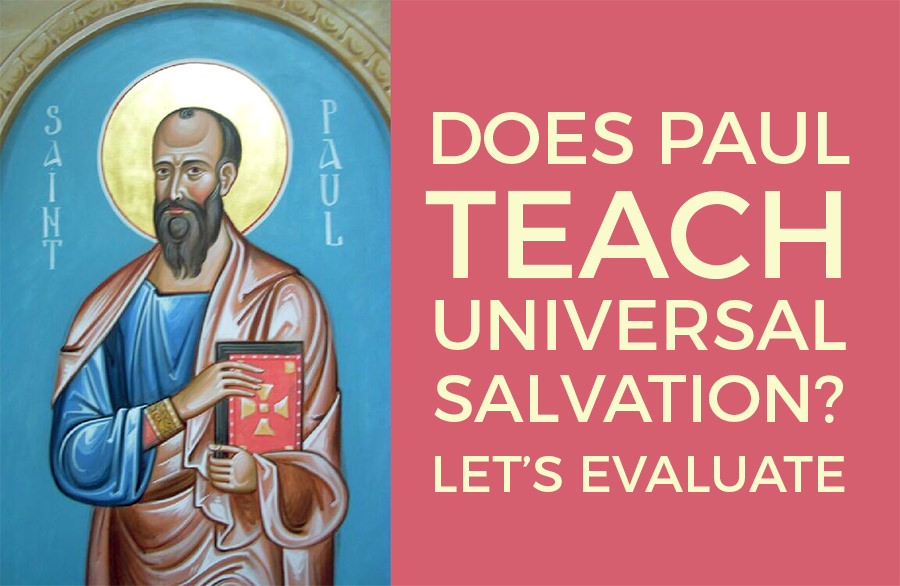Views of Hell--Universalism
The concept of universal reconciliation (UR), or sometimes known as universalism, is perhaps the most controversial among the Christian doctrines about the afterlife. For example, professor and theologian Roger E. Olson calls UR “the most attractive heresy.” The Gospel Coalition calls UR “superficially attractive.” And Patheos published an article by Grayson Gilbert that declares, “I plead with you then to repent and renounce the teaching of universalism, not for the sake of your reputation, but your soul.” This last statement suggests that believing all individuals will ultimately be saved is a one-way ticket to hell since accepting such a doctrine condemns those who would dare consider universalism a possible alternative.
Throughout the church’s history, UR has fallen under condemnation by many pastors, theologians, and scholars (especially modern conservative evangelicals). However, belief in UR is at an unprecedented high. What is the justification for this increase in acceptance if it is so effortlessly established as a heresy? What is the Scriptural authority for considering that all humanity will celebrate with Christ in Heaven at the eschaton? The validiation of this doctrine rests not on strawman fallacies that appeal to “feelings and emotions” but on two distinct matters: (1) the Scriptural witness and context of numerous passages and (2) the philosophical debate, which will not provide a “clear and plain” answer but force the individual to dig deep into God’s character.
History of Universal Reconciliation
Though universalism is becoming more prevalent today, surprisingly, there is a substantial amount of early church witness to the doctrine of universal reconciliation being an orthodox position. If you have not read my blog post on that subject, it can be found HERE. It is a good review of how, when, and why UR came into the collective mainstream of Christian consciousness. Therefore, I will simply give a very brief outline of it here.
UR has been around as long as any Christian doctrine has been investigated since those first few centuries after Christ. Origen of Alexandria is generally acknowledged as the father of UR, along with Clement of Alexandria, Gregory of Nyssa, and Didymus the Blind. Origen, born and raised a Christian, was the head of the Alexandrian Theological school that explicitly taught UR to all who attended, commencing at the end of the second and beginning of the third century. That doctrine persisted in being taught for centuries until the doctrine of eternal torment became pervasive after being established in the western, Latin-speaking region, beginning with Tertullian in the third century. When the emperor Justinian rose to power in the sixth century, he propagated the position of eternal torment in hell from Augustine’s teaching and thus, became the dominant position at that time up until the Enlightenment age.

Modern Universalism
Universalism developed further into the 18th to 19th centuries with the increase of several theologians and pastors who postulated a universalist position, such as Walter Balfour, Edward Beecher, and John Wesley Hanson. It was likewise around this period that publications such as the Universalist Magazine and the Universalist Herald derived from promoting the theology of UR to the general populace. Not surprisingly, they received considerable resistance from countless orthodox Christians who understood the concept of eternal torment in hell was a clear and plain teaching of the Biblical witness. This initiated the “second expansion” of universalism into Christianity in the sixth century. Nevertheless, it is still contested in the majority of Christian denominations today.
Scriptural Support
Undeniably, one of the primary arguments modern conservative evangelicals utilize in their dispute against the doctrine of universal reconciliation is the scarcity of Scriptural confirmation. However, this figures to be more of a personal interpretive lens through which many perceive Scripture to be rather than what Scripture unquestionably says. For example, most who embrace the traditional position of hell do so out of support for the Biblical passages that address hell and destruction as being “clear and plain.” Those two words frequently occur in dialogue with many conservatives around any issue of Christian doctrine because many read the Bible and then consider interpretation to be effortless because the Bible is easy to understand, save for a few obscure passages. It is not surprising to hear someone articulate that the doctrine of hell is clear in the Bible and then have them quote a passage from Revelation or a parable from Jesus.
Was Paul a Universalist?

Nevertheless, those who hold to UR do have solid Scriptural support for believing that all will be saved. Though countless passages can be examined, I would like to concentrate on the central three passages that commonly appear to support universalism. The first, and perhaps one of the more prominent passages, is Romans 5:18-19 which declares, “Consequently, just as one trespass resulted in condemnation for all people, so also one righteous act resulted in justification and life for all people. For just as through the disobedience of the one man the many were made sinners, so also through the obedience of the one man the many will be made righteous.”
Notice the word “all” in verse 18. The one trespass (Eve consuming the fruit) resulted in condemnation for all people. The all indicates all humanity since all humanity is sinful by nature. But then, would the word all in the second half of the verse not also pertain to all humanity? Paul compares one sinful act that impacted all humanity and demonstrates that Christ likewise died for all. Paul does not pronounce that Christ died for some, but He died for all. Numerous non-universalists would perceive this passage as declaring that Christ’s death was available to all but not all will accept it. However, that particular connotation is not in the text. Romans 5:18-19 does appear “clear and plain” in its support of universalism, to use a common conservative expression.
Universalism in 1 Corinthians?
An additional primary biblical text that appears to confirm UR is 1 Corinthians 15:22, which articulates, “For as in Adam all die, so in Christ all will be made alive.” That is virtually indistinguishable to the above passage from Romans. Yet again, Paul contrasts the one sin that instigated death for all and compares that to the one action from Christ that “all will be made alive.” Practically every English translation renders this verse exceptionally close to the one I quoted above (NIV) except the NLT, which states, “Just as everyone dies because we all belong to Adam, everyone who belongs to Christ will be given new life.” This translation fundamentally alters Paul’s “clear and plain” intent and compels it to imply something different.

God’s Desire to Save Mankind
A concluding passage (though there are many, many more) that ostensibly maintains universalism and happens to be a relatively controversial one derives from 1 Timothy 2:3-6, where the author writes
This is good, and pleases God our Savior, 4 who wants all people to be saved and to come to a knowledge of the truth. 5 For there is one God and one mediator between God and mankind, the man Christ Jesus, 6 who gave himself as a ransom for all people. This has now been witnessed to at the proper time.
Does All mean All?
Again, the word “all” is employed here to denote all people. Not just “some” or “many,” but all. The Greek phrase “pantas anthrōpous” is likewise utilized in 1 Timothy 2:1 when the author encourages prayers on behalf of “all people.” Again, it is challenging to resolve that verse as pertaining to all individuals, although just a few verses after the exact phrase indicates something completely different.
Many will suggest that in this passage, it is only God’s “desire” that all men are saved and that it does not imply that God will indeed save all. As a result, some Christians will invariably interpret Romans 9:22 (“What if God, although choosing to show his wrath and make his power known, bore with great patience the objects of his wrath—prepared for destruction?”) as being definitive that that is precisely what God, in fact, does. The same ambiguity that may be present in 1 Timothy 2:3-6 is the same ambiguity present in the rhetoric of Romans 9:22. Though, one could argue that the Timothy passage is clearer than the Romans verse in denoting the difference between what God does and what he might do.
Is the Bible Clear?
I recognize these verses may not be sufficient enough to ascertain if the Bible convincingly teaches UR. But if one were to use the “clear” sense of Scripture in the parables from Jesus and the writings from Revelation about hell, then would a didactic message from Paul not be in the same category as a clearly intended meaning as in apocalyptic literature? Though UR is far from conclusive, there are several passages that numerous traditionalists (and Annihilationists) must wrestle with to uncover what the biblical text intends to suggest.
Each Bible reader and interpreter has a specific lens with which they view the Scriptural witness. If one is a traditionalist, they will view the Bible through that lens, and all passages that may appear contradictory at first will be filtered through that lens. Likewise, the same issue is present in universalists who see clear passages teaching UR. Subsequently, if a passage appears contradictory, they are interpreted through the lens of salvation for all. Many Christians will understandably claim they do not do this and that they take all passages in context. Though, that is certainly not the case for everyone. All Christians do this to some extent—some more than others. Again, if we are to be sincere interpreters, we ought to at least acknowledge and recognize the particular lens that we interpret Scripture with.
Language of Death
One of the more frequent objections to UR is the repeated use of words such as “death,” “destruction,” and “die.” Initially, those words appear challenging for the universalist to overcome. For example, the common Greek word for destruction is appolumi (ἀπόλλυμι Strongs Grk 622) which appears to denote complete and total destruction. However, words have a “semantic range” and do not constantly indicate one particular definition. One of the potential explanations of appolumi is to “lose or ruin.” An example is seen from Luke 15:8 when Jesus is telling a parable of the lost coin. He says, “Or what woman, having ten silver coins, if she loses (appolumi) one coin…” However, appolumi also implies to literally destroy as in Mark 3:6, “The Pharisees went out and immediately held counsel with the Herodians against him, how to destroy (appolumi) him.”

There is considerable debate about this word amongst numerous Christians who embrace certain opinions concerning hell. I do not have sufficient time in this post to give it the attention it requires but will write about this in a future blog post. But one thing is clear—apollumi is not clear. At least, not all the time. Dr. Bill Mounce, an NIV translator and teacher of Koine Greek, maintains, “There is nothing in the word that necessitates apollumi means a permanent and total destruction. I think this was the question I was asked. It certainly can carry that meaning, but it is context (including one’s theological understanding of the ideas conveyed by the word) that make the final decision.” To see more of what Dr. Mounce said in his own words, the link is HERE.
Other Words of Death
There are a few additional words for destruction in the original Greek that may have a similar semantic range as apollumi, such as phthora, which means “a bringing or being brought into an inferior or worse condition, a destruction or corruption.” Likewise, kataphtheiro means to destroy, corrupt, deprave. Numerous words can have countless meanings depending on context, as Dr. Mounce clarified above. Destroy, in Greek, does not always necessitate being sent to hell or being completely annihilated.
This is relevant because if Jesus said to fear Him who can “apollumi both body and soul in Gehenna” (Matt. 10:28) it can conceivably undertake an entirely different connotation than the common understanding of destroying someone in the underworld. The primary point being made from a universalist perspective is that the body will be destroyed/ruined and the soul will continue to live, perhaps in a new body, in Heaven with Christ. Most would view the destruction of the body as a means to a new life in the eternal state and that all will eventually be made whole. Others, however, may require a period of refinement first before being in the presence of God.
Fire of God
A fascinating study that relates to this subject matter well is the “refining fire of God.” In the OT, fire is frequently discussed in the same manner as one would refine gold and other precious metals. For example, Zechariah 13:8-9 states, “In the whole land, declares the Lord, two thirds shall be cut off and perish, and one third shall be left alive. And I will put this third into the fire, and refine them as one refines silver, and test them as gold is tested. They will call upon my name, and I will answer them. I will say, ‘They are my people’; and they will say, ‘The Lord is my God.’” This verse states that those who are left alive will be thrown into the fire for the purpose of refinement, not destruction.
A handful of additional verses that speak of fire as refinement are, “Behold, I have refined you, but not as silver; I have tried you in the furnace of affliction” (Is. 48:10). “He (God) will sit as a refiner and purifier of silver, and he will purify the sons of Levi and refine them like gold and silver, and they will bring offerings in righteousness to the Lord” (Mal. 3:3). And lastly, a NT example is from 1 Peter 5:10 where the author asserts, “And after you have suffered a little while, the God of all grace, who has called you to his eternal glory in Christ, will himself restore, confirm, strengthen, and establish you.” There are many other verses that speak of a refiner’s fire that can be viewed HERE.
However, this last verse demonstrates that during the purification process that all will endure before they are led into the presence of God. If this is the case, then much of the language from Jesus and other NT authors that talk of fire, have that as their contextual background when they write about fire. In a universalist perspective, all will go through a period of refinement—some more than others, depending on what they have done on earth—before taking pleasure in eternity with God.
Conclusion
Though not an absolute in any way, the doctrine of universal reconciliation has some validity to its merits and those that adhere to that doctrine, as some assume, read into the Bible what they want. Neither do universalists “pick and choose” which verses to follow and which to ignore (another strawman fallacy). Admittedly, though, the universalist perspective is a lens through which some view the Scriptures. If all Christians could understand that lenses are simply the modes of interpretation, and their own personal interpretive methodology is not always the correct one, then maybe more believers could have fruitful discussions with those of opposing viewpoints—especially concerning a doctrine as serious as this one. It is my hope that Christians do not denigrate each other because of their beliefs concerning the doctrine of hell and that all can come to a mutual understanding that they all follow Christ to the best of their ability.
Previous blog post on Annihilation is found HERE
Next blog post on Gehenna is found HERE
Further Reading:
David Bentley Hart. That All Shall Be Saved. New Haven, CT: Yale University Press. 2019.
John Wesley Hanson. Universalism, The Prevailing Doctrine of the Christ Church During its First Five Hundred Years; With Authorities and Extracts. Boston and Chicago Universalist Publishing House, 1899.
https://www.billmounce.com/monday-with-mounce/does-apollumi-mean-%E2%80%9Cdestroy%E2%80%9D


